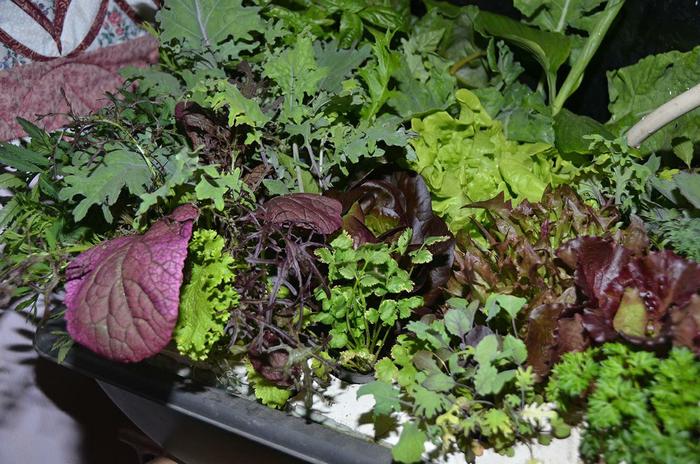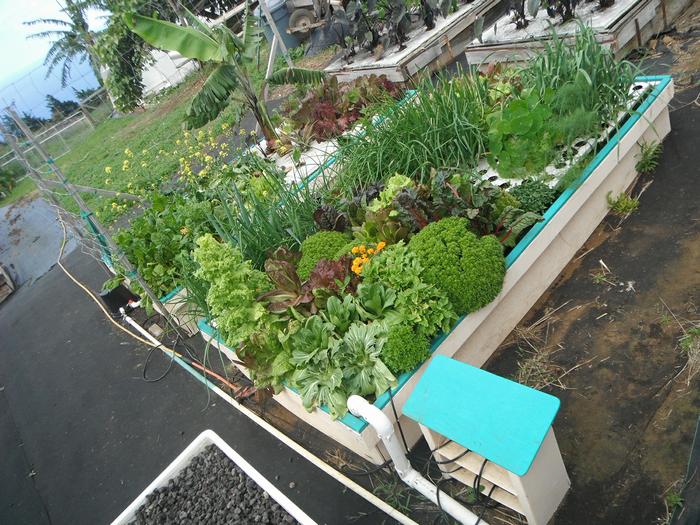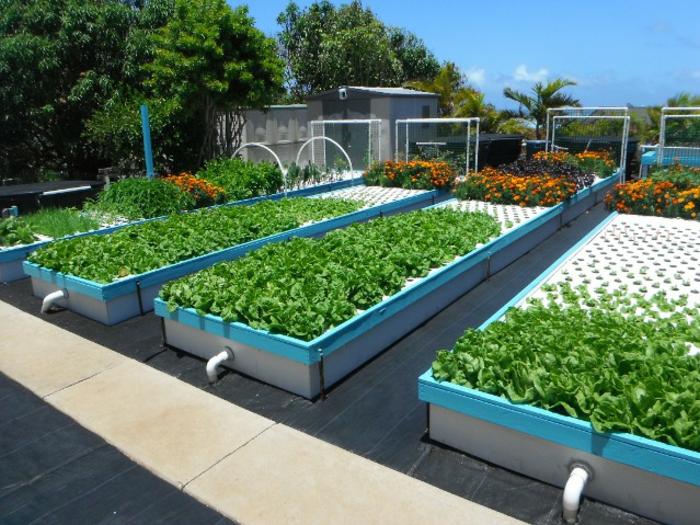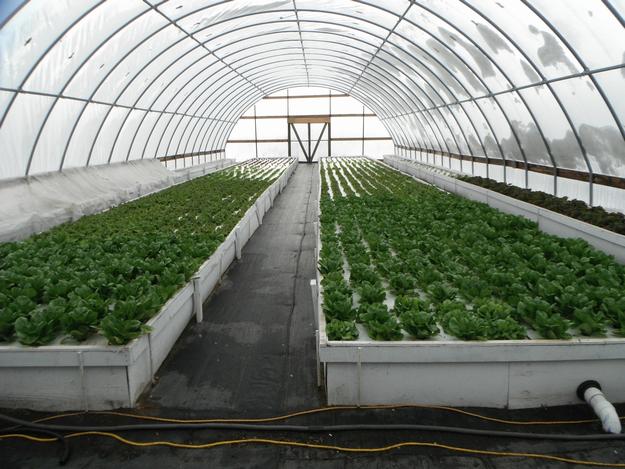Which System For Me?
People often ask “what’s the best aquaponics system?”. We wish there was a simple answer for that, such as “Home Depot model 42”. The answer to “what’s the best system for you” is very dependent on what you want aquaponics to do or get for you. Also with your budget in mind, the bigger an aquaponics system you build, the more money you will spend. Wait! You said “build”! I don’t have any building skills; I can’t build a system. Can’t I just get an aquaponics kit? Well, yes and no; more about this in a moment; we’ll discuss appropriate system size for you first.
If you simply want to have fun with aquaponics and have limited space, or can only grow indoors, a TableTop system such as the one below is perfect for you.

If you have more space, such as a small suburban backyard or large basement, and want to actually generate some food, a Backyard or Micro System of 64 or 128 square feet such as the one below may be perfect for you.

If you have more space than that, such as a large suburban backyard, and want generate a lot more food to share with family and neighbors, a BIG Backyard or Family System of 256 or 512 square feet such as the one below may be perfect for you.

If you have a large space available, such as a one-half acre to one-acre lot, and want to make either a part-time or full-time income from aquaponics, plus grow a lot more food for your family, a Commercial System of 2,500 or more square feet such as the one below may be perfect for you. Woah! Isn’t 2,500 square feet a lot? Yes, and no.
(Below) Showing a small commercial aquaponic greenhouse after a light winter snow.
You’re asking for a business that will support you full-time and replace your job, yes? Well, we’ve found through 8 years experience that a single person can handle up to 3,600 square feet of aquaponics system; so to be conservative, we say 2,500 square feet of aquaponics system area (not greenhouse area, this is explained in posts in our Greenhouse Categories). 2,500 square feet is the minimum we consider to be a viable “commercial system”, and even so, you need to be on the top of your game as a farmer, in marketing and communications, in understanding the technology, and finally, in working hard, smart, and clean. Aquaponics systems don’t make money by themselves, you make money by working them and growing stuff to sell.
I said we’d discuss kits: the best aquaponics kits save you frustration, time, and money by putting all the parts into one simple package with good instructions and support. The bad ones are based on ineffective or faulty technology that will cause you problems and give you grief for years afterwards, and often cost 3 to 10 times what it would cost you to just buy equivalent parts at Home Depot or Lowes. Even the best aquaponics kit requires you to glue PVC pipe, thread couplings together, do other limited plumbing, often some electrical wiring, site preparation, and much more. No kit “assembles itself”. So don’t go into buying a kit all starry-eyed, thinking it will be a magic potion for aquaponics. They aren’t.
“System Kits”, and “Complete Systems”: We can’t use trade names or refer to specific companies doing aquaponics business because some of them have threatened to sue us for being so honest in print. However, there’s a bewildering variety of systems out there that are built with old used plastic barrels (or even more expensive brand-new ones), fiberglass planting trays, plastic and fiberglass fish tanks, tank stands, custom greenhouses, “special” biofilters, “trademarked” and “patented” this and that; it goes on and on.
We’ve seen websites offering aquaponics systems for sale that cost three to ten times as much as if you just bought the parts yourself. These inflated prices often do not even include all the materials necessary to build the system, nor shipping, nor construction and assembly. And the “stuff”, or hardware, is not the most important part of an aquaponics system; the most important part is the information you get to run it with, so that problems are minimized and productivity maximized. These sellers don’t include the experience gained during years of operating a commercial aquaponics farm, because they simply don’t have that experience. We feel many of these people have been blinded by the money in this young field, and do not recognize the built-in limitations and problems they are passing on to their customers. Sadly, many of these people are selling “Commercial” kits and trainings!
We sell knowledge and real-world experience: our courses, website, and DIY products show you how to build and operate the most economical, productive, efficient, and durable systems yourself; from parts and materials anyone can buy. If you take the time to acquire the knowledge, you will save a ton of money. Even if you have someone else build one of these systems for you (and any knowledgeable contractor or experienced builder can easily do so), you will still save a LOT of money over buying “system kits”, or “complete systems”. Everything we tell you is based upon our direct experience, or the experiences of our many successful students, who are generous enough to share their experiences with us, and you.
Aquaponics “Experts”. Aquaponics is a new science. There are no “Aquaponics Departments”, or “Ph.D. in Aquaponics” at universities (as there are people with Ph.D. degrees in almost everything else). As a result anyone can claim expertise in the field of aquaponics. So, how do you sort all these people out? You use your common sense, and, as they say in detective novels: “follow the money”. Understand what people are making money from can help you understand their motivation in getting involved with you; whether to just make money from you, or to help you solve your problems and make money in the process.
Consultants want to sell you consulting, and academics want more than anything to get that next paper in a prestigious publication. They both have good points: a good consultant can solve an expensive problem cheaply; and there is an amazing amount of good information available thanks to all the academics that have studied and published over the years. However, many consultants don’t even operate commercial aquaponics systems, and thus the value of what they have to share is questionable. Academics never have to pay their own bills, thus the possibility of making a profit from their technology is questionable..
Professional aquaponics growers are people who make a living from operating aquaponics systems and producing food. They combine the best traits of consultants, amateurs, and academics with the ability to make a profit. A professional can give you more practical and useful advice than a consultant can, because they have more hands-on experience with the subject. The professional will try new things, even if they seem unlikely, because that’s where the most valuable discoveries come from. And a professional is always interested in the next bit of knowledge and understanding, just as academics are, because it has the potential to make his or her job easier.
There’s a lot of information out there: some good, some bad. Listen with a critical ear, and if you’re checking out sites on the Internet, look for ones with real pictures of operating farms, (not just colored computer renderings), and an email or phone that someone actually answers! Also, make sure to ask for the names and contact information for some of their successful students! If they can’t provide any, that tells you a lot!

Leave a Reply